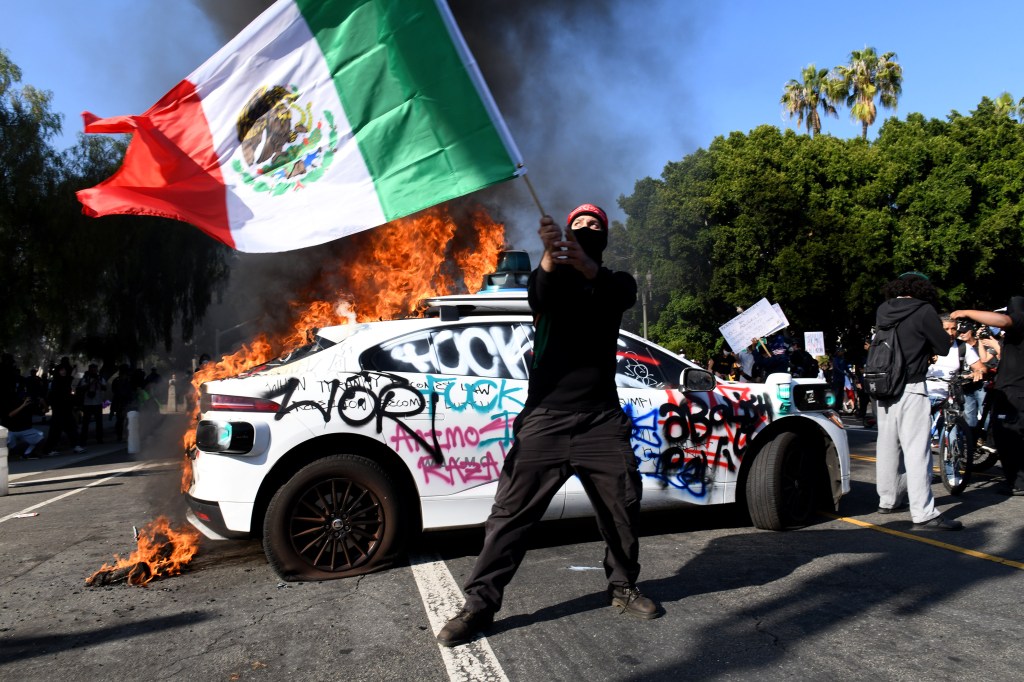
Rivers of ink have been spilled in the last few days highlighting various perspectives on immigration raids, protests and riots in Los Angeles and other cities. But one point of view has gone largely ignored so far: that of the legal immigrants who are hurt by the disruption created by the raids and protests.
Legal immigrants seeking to obtain green cards, work permits, and other key immigration benefits and protections are having their processes delayed and their lives disrupted due to the closure of federal buildings caused by the protests. This is a major problem for individual immigrants — one that protestors should seriously consider if they truly care about immigrants’ rights.
Many well-intentioned Americans are outraged by the Trump administration’s crackdown on immigrants. I am, too — I am fiercely critical of the U.S. immigration system for its attack on peaceful workers, and have been since before the current administration. I consider the recent ICE raids an expression of that immoral system.
But destroying property, blocking streets and forcing the closure of federal buildings doesn’t help immigrants — it hurts them in many ways. One such way is that hundreds of immigrants across Los Angeles and Orange County are having their immigration appointments canceled and cases delayed because the agencies simply cannot physically operate.
As I and many others have explained before, immigrating legally to America is a Kafkaesque process. The tiny minority of people who fit into the narrow categories for legal immigration have to go through complicated, expensive and time-consuming immigration procedures that often leave them separated from family, without a job, or without protections in an increasingly anti-immigrant political climate.
The agency in charge of granting immigration benefits (USCIS, U.S. Citizenship and Immigration Services) operates in federal buildings such as the ones in Los Angeles and Santa Ana. At the time of this writing, the Los Angeles office has been closed for an entire week due to the protests, and the Santa Ana office closed for at least two days. USCIS has massive backlogs in processing immigration benefits as it is, and forced closings only add to these. Behind each delayed case is an immigrant who can’t work, can’t travel or is simply in legal limbo and vulnerable to ICE’s maniacal enforcement until their cases get sorted out.
This is not some abstract or theoretical damage, or simply adding a couple of days to an already long immigration process. Immigrants awaiting interviews to obtain their green cards and other benefits in LA and Santa Ana have had their interviews canceled this week after months, or sometimes years, of waiting. It’s unclear when they’ll get their interviews rescheduled and what might happen in between that may make it harder for their cases to be approved.
It’s hard to overstate how devastating it is to have an immigration interview canceled, just as it’s hard to describe how stressful it is to go through the legal immigration process to those who never had to endure it. Visit any immigration forum online, or talk to anyone currently undergoing the process, to get an idea of the high stakes and the anxiety that legal immigrants routinely go through.
I know this well because I went through this process myself. It’s excruciating. One of the stressors I endured during my immigration journey is that, due to the backlogs, I couldn’t get authorization from the government to travel abroad in a timely manner. That meant that I couldn’t visit my dying father in my home country before he passed — an emotional toll that I will carry with me forever. A canceled interview or delay in an immigrant’s case might mean they don’t get to visit their dying parent, or that they are kept away from family. Immigrants may also have their work authorizations delayed, which could cost them their jobs and livelihood. This problem exceeds the delays from the protests, and the system itself needs to change — but delays caused by protests make it worse.
Last week, before the protests erupted, I was at the Santa Ana USCIS office. I witnessed nervous immigrants, who had been patiently waiting for their appointments, sitting in the waiting room holding on to their folders full of paperwork to prove to an increasingly hostile government that they deserve to be here. They were visibly anxious, some praying, some going over their own applications for the hundredth time. They had all been anticipating that day for months, hoping to finally get the status or benefit they have been working and investing towards for months or years. Those whose interviews were canceled in the last few days due to protests didn’t get that chance.
I also witnessed government employees trying to help — despite notorious cases to the contrary, many government employees working in immigration do want to help immigrants get legal status within the limitations of an already restrictive legal system. Those who claim to care about immigrant rights would do well to let these employees do their job. (USCIS is not ICE — they are a different agency with different purposes and different people.)
Well-intentioned people who care about immigrants should understand that coercive protests are a violation of the individual rights, including of immigrants — even if what they’re protesting is immigration enforcement. Not only do these protests cause tangible damage to individual immigrants, but they also play into the administration’s hands and help them rationalize further crackdowns and collectivize immigrants as “violent” and “criminal.”
People can protest and make their voice heard without engaging in coercion. Before sanctioning violent protests with their presence, even if they themselves are not violent, those who care about the rights of immigrants should know that what they’re doing is further hurting people who are already under attack.
Agustina Vergara Cid is a Young Voices contributor. You can follow her on X at @agustinavcid



